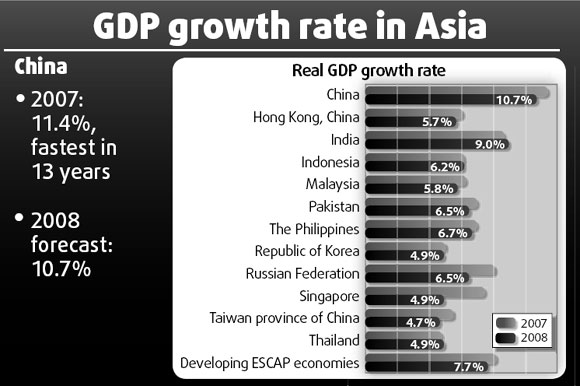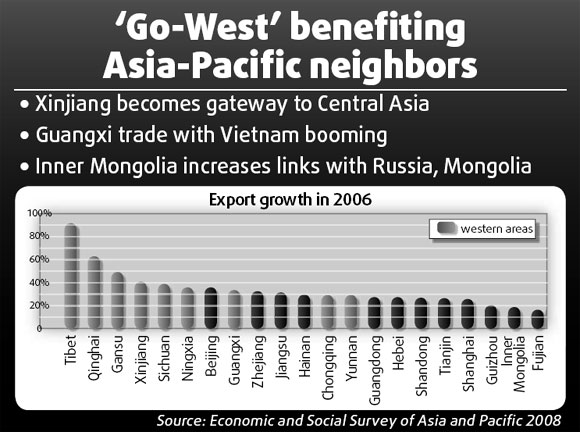Slower, steady growth
The country will see a moderate slowdown in growth this year, but remained underpinned by strong domestic demand and government social spending despite a slowing United States economy, the ESCAP also reported.
The report expected an easing in growth to 10.7 percent from 11.4 percent in 2007 - the fastest for China in 13 years - as a result of a slowdown in exports and government measures to cool growth.
"Investment continues to be the main driver of growth, remaining resilient despite government cooling measures and with support from low real interest rates," the ESCAP said.
"A slowdown in exports and the government's measures to cool the economy are the main reasons for the moderation," the survey said.
The ESCAP also downplayed any significant impact on China's economy resulting from a downturn in the US economy due to the ongoing subprime credit crisis.
"In a worse-case scenario - where the United States economy goes into a recession - the impact on China will not be as great as on other Asia-Pacific countries," it reported.
In terms of China's overall trade, the country witnessed increasing exports to the European Union last year, a shift which compensated for a steady fall in exports to the US - China's second-largest export market, the report said.
The country also witnessed a boom in trade with Africa.
Growth also came in service exports, which rose globally by an average of 16 percent over 1995-2006.
"China had the best performance in transport services exports of all Asia-Pacific countries, growing at 34 percent per year over 2000-2006," the ESCAP reported.
However, the country is facing an increasing challenge from inflation.
Last year, inflation rose dramatically to 4.8 per cent - the highest in a decade, and three times the 1.5 percent reported in 2006.
Higher international oil and food prices were identified as chief inflationary concerns.
"Rising food prices are a bigger inflationary concern than oil prices because food accounts for a far higher proportion of consumer spending. Food price inflation particularly hits low-income households," the ESCAP said in the survey.
The country's fast-paced growth was coming at an increasing cost to the environment, while the loss of arable land to manufacturing also raises concerns, the ESCAP warned.
"The destabilizing effect of growth on the environment is becoming more apparent. Air pollution, especially in large cities, is increasing the incidence of lung disease," it said.



(
China Daily March 28, 2008)